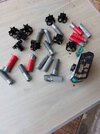- Joined
- 29 January 2006
- Posts
- 7,228
- Reactions
- 4,476
The car industries are asking for policies that are relevant to advancing the inevitable transition. That's completely political.Of course the car industry is asking for more assistance, if I was a vehicle manufacturer I would be looking for money to help with the transition of my business and look for anyone I could blame for the fact I can't make enough cars to meet demand.
That is logical, not political.
Where did any of them seek subsidies?
Your point was about a small market for RHDs...The third of the World that drives on the right hand side. is mainly made up of third world impoverished people i.e India, South Africa, which I actually alluded to in my post regarding the propensity of LHD vehicles are made for large first world wealthy consumers.
So really my case still stands the majority of manufacturing being built will be for Chinese, U.S and the EU LHD markets, despite disagreement.
How are hundreds of millions of units a small market?The right hand drive market is small on the World stage,
Attached to my point was the fact that this small market that you talk about includes a few hundred million people who are relatively well off and will be accommodated by production lines for RHDs in the usual way that automakers satisfy this demand. However, as repeated many times now, Australia has not been given priority by automakers so the majority of RHDs will be headed elsewhere until there's a major change in our policies or external demand is met.





